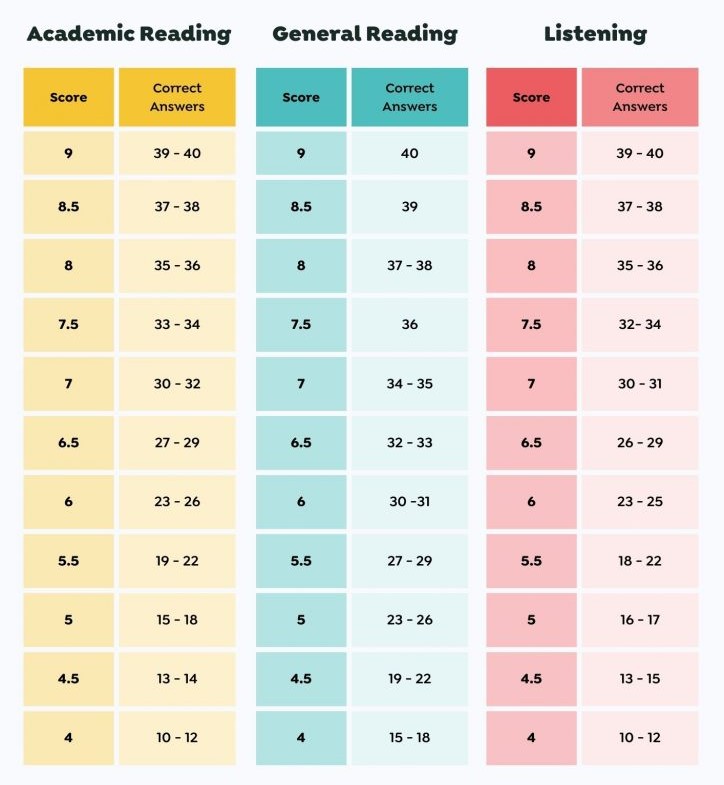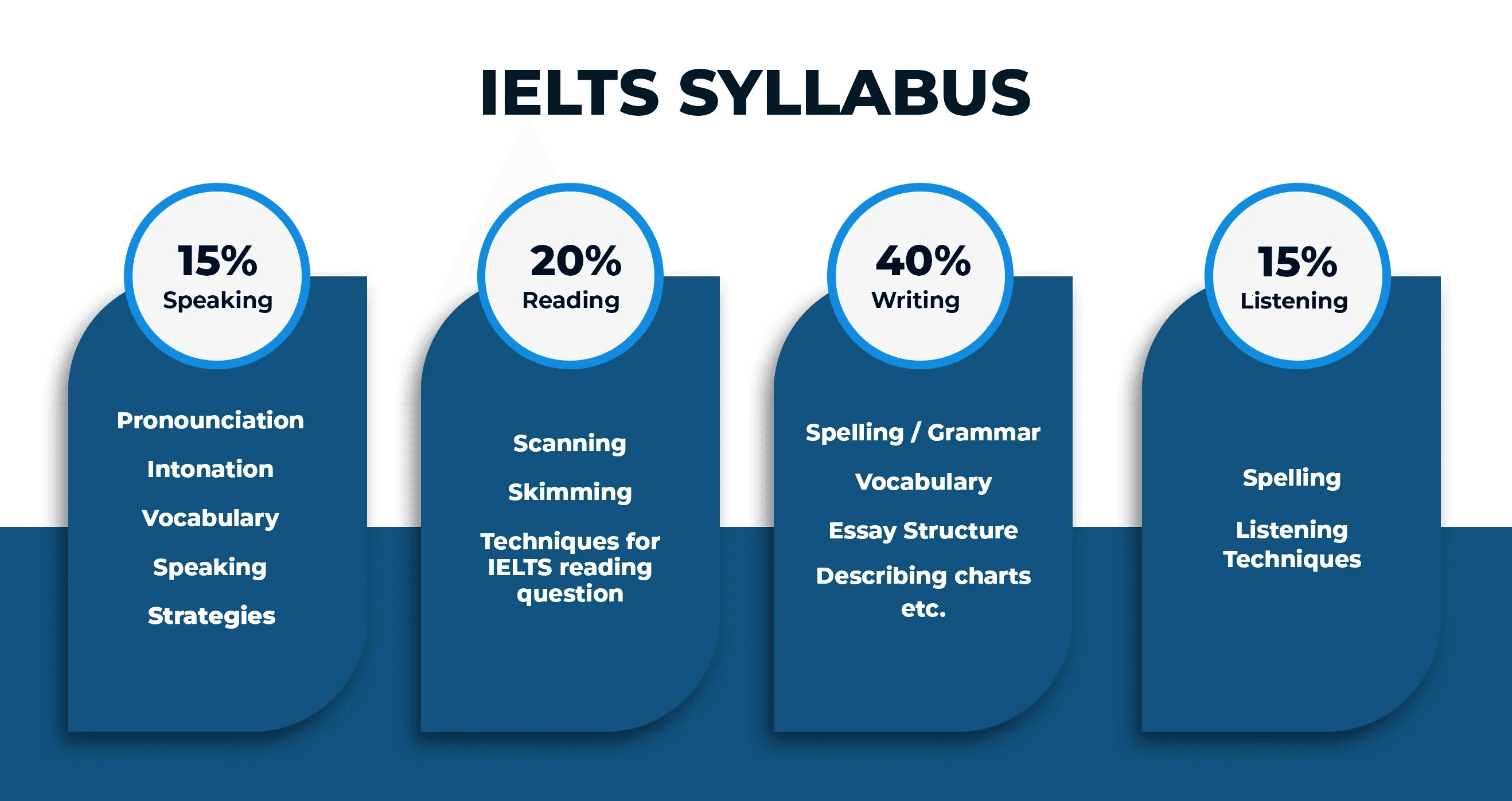The International English Language Testing System (IELTS) is one of the world’s most popular standardized tests designed to assess the English language proficiency of non-native speakers. Whether you’re planning to study abroad, migrate, or work in an English-speaking country, IELTS is often a mandatory requirement.
In this article, we’ll break down everything you need to know about IELTS, its structure, types, scoring system, preparation tips, and more. Let’s get started!
What is IELTS?
IELTS is a globally recognized English language proficiency test jointly managed by the British Council, IDP: IELTS Australia, and Cambridge Assessment English. It’s designed to measure your ability to communicate effectively in English across four essential skills:
- Listening
- Reading
- Writing
- Speaking
What makes IELTS stand out is its reputation for fairness and reliability. It uses real-life scenarios, so the skills you’re tested on are practical and applicable. That’s why over 3.5 million tests are taken annually in more than 140 countries.
Why Take the IELTS?
Academic Pursuits
If you’re planning to study at a university or college where English is the medium of instruction, IELTS Academic is often a prerequisite for admission. Many top-tier institutions in countries like the UK, USA, Canada, and Australia use IELTS scores as a benchmark to do good in an academic environment.

Did you know? Over 11,000 institutions worldwide accept IELTS as proof of English proficiency. That includes prestigious universities like Oxford, Harvard, and the University of Toronto.
Migration
For those planning to migrate to English-speaking countries, IELTS General Training is a key step. Governments in Australia, Canada, New Zealand, and the UK use it to ensure that migrants can integrate and contribute effectively. For instance, Canada requires a minimum CLB (Canadian Language Benchmark) score of 7 for most immigration pathways.
Employment
Many employers require proof of English proficiency to hire non-native speakers. Achieving a high IELTS score can open doors to global job opportunities, especially in industries like healthcare, IT, and education.
A survey found that 82% of employers in English-speaking countries value IELTS scores during the hiring process.
IELTS Test Formats
1. IELTS Academic
This format is tailored for higher education and professional registration. It’s ideal if you’re aiming to:
- Enroll in undergraduate or postgraduate programs.
- Join professional organizations in fields like medicine or engineering.
2. IELTS General Training
This format is more suited for migration, work, or secondary education. It assesses practical, everyday English skills for scenarios like:
- Communicating at work or in social settings.
- Understanding public information (e.g., notices, advertisements).
Nearly 80% of test-takers opt for the Academic version, while 20% choose General Training, mostly for migration or employment purposes.
Feature | IELTS Academic | IELTS General Training |
|---|---|---|
Purpose | Higher education, professional | Immigration, work, general use |
Content | Academic English tasks | Real-life, practical English |
Test Structure and Format
The IELTS test is divided into four sections, each assessing a specific skill. Let’s explore them in detail:
1. Listening
- Duration: 30 minutes (+10 minutes to transfer answers).
- Tasks: Four recorded audio segments, including monologues and conversations.
- Key Skills Tested: Understanding main ideas, specific information, opinions, and attitudes.
Practice with audio clips from diverse accents like British, American, and Australian to get a better grip on understanding different speech patterns.
2. Reading
- Duration: 60 minutes.
- Content:
- Academic: Three long passages with complex language from journals, books, or reports.
- General Training: Extracts from newspapers, advertisements, and manuals.
- Tasks: Multiple-choice, matching headings, summary completion, and more.
You’ll need to read approximately 2,500 to 3,000 words during the Reading test—so improving your reading speed can be a game-changer.

3. Writing
- Duration: 60 minutes.
- Task 1 (Academic): Describe visual data like graphs, charts, or diagrams.
- Task 1 (General Training): Write a formal or informal letter.
- Task 2 (Both): Write an essay presenting arguments, discussing problems, or offering solutions.
Essays in Task 2 often account for two-thirds of your Writing score, so spend more time practicing this section.
4. Speaking
- Duration: 11-14 minutes.
- Format: A face-to-face interview with an examiner.
- Part 1: Introduction and general questions about yourself.
- Part 2: A 1-2 minute talk on a given topic.
- Part 3: A discussion related to the topic in Part 2.
Many test-takers find Speaking to be the most nerve-wracking part. Remember, it’s okay to take a moment to think before answering.
Know more about: IELTS Question Pattern
Scoring System
IELTS scores are reported on a band scale of 1 to 9, where each band corresponds to a specific level of English proficiency:
IELTS Band Score: 9 — Skill Level: Expert
- The test taker has a fully operational command of the language.
- Their use of English is appropriate, accurate, and fluent, and shows complete understanding.
IELTS Band Score: 8 — Skill Level: Very good
- The test taker has a fully operational command of the language with only occasional unsystematic inaccuracies and inappropriate usage.
- They may misunderstand some things in unfamiliar situations. They handle complex and detailed argumentation well.
IELTS Band Score: 7 — Skill Level: Good
- The test taker has operational command of the language, though with occasional inaccuracies, inappropriate usage and misunderstandings in some situations.
- They generally handle complex language well and understand detailed reasoning.
IELTS Band Score: 6 — Skill Level: Competent
- The test taker has an effective command of the language despite some inaccuracies, inappropriate usage and misunderstandings.
- They can use and understand reasonably complex language, particularly in familiar situations.
IELTS Band Score: 5 — Skill Level: Modest
- The test taker has a partial command of the language and copes with overall meaning in most situations, although they are likely to make many mistakes.
- They should be able to handle basic communication in their own field.
IELTS Band Score: 4 — Skill Level: Limited
- The test taker's basic competence is limited to familiar situations.
- They frequently show problems in understanding and expression.
IELTS Band Score: 3 — Skill Level: Extremely limited
- The test taker conveys and understands only general meaning in very familiar situations.
- There are frequent breakdowns in communication.
IELTS Band Score: 2 — Skill Level: Intermittent
- The test taker has great difficulty understanding spoken and written English.
IELTS Band Score: 1 — Skill Level: Non-user
- The test taker has no ability to use the language except for a few isolated words.
IELTS Band Score: 0 — Skill Level: Did not attempt the test
- The test taker did not answer the questions.

The overall band score is calculated by averaging the scores in all four sections and rounding to the nearest half or whole band. For example, if you score 7.0 in Listening, 6.5 in Reading, 6.5 in Writing, and 7.0 in Speaking, your overall band score will be 6.75, which is rounded to 7.0.
You can check: IELTS Scores
Scoring Breakdown
The scoring of individual sections works as follows:
- Listening and Reading: Each correct answer is worth one mark. The total number of correct answers is then converted into a band score based on pre-set criteria.
- Writing and Speaking: These sections are assessed by trained examiners using specific criteria like coherence, grammatical range, lexical resource, and task achievement.
IELTS also uses half-band scores (e.g., 6.5) to provide a more precise assessment of your abilities. Consistency across all sections is key if you want to achieve a high overall score.
Syllabus
The IELTS syllabus covers essential language skills to test your English proficiency:
- Listening:
- Understanding accents (British, American, Australian).
- Grasping main ideas, specific details, and implied meanings.
- Reading:
- Analyzing academic and non-academic passages.
- Completing tasks like multiple-choice, matching headings, and summary completion.
- Writing:
- Academic: Describing charts, graphs, and data.
- General: Letter writing and essay composition.
- Speaking:
- Building fluency through interviews and discussions.
- Structured speaking practice.
Here comes the details: IELTS Syllabus

Key Dates
IELTS tests are offered year-round on multiple dates. Key points to remember:
- Tests are conducted up to 4 times a month.
- You can select a date that suits your schedule.
- Register early, as slots fill up quickly, especially during peak application seasons.
IELTS is conducted up to 48 times a year, offering flexibility for test-takers to choose a suitable date.
Know details : IELTS Dates
Registration Process
The IELTS registration process is relatively simple and involves the following steps:
- Visit the Official IELTS Website: Go to the official IELTS website or the site of your local test center. The website will guide you through the process of booking the test.
- Create an Account: If you don't have one, you will need to create one on the IELTS registration portal. This will involve providing personal information like your name, contact details, and identification details (passport or national ID).
- Choose Your Test Type: You can choose between the Academic or General Training version of the IELTS, depending on your purpose (study, work, or migration).
- Select a Test Location and Date: You will need to choose a test center and select an available test date. IELTS test centers are located in many countries, so you'll have plenty of options.
- Fill Out the Application Form: Complete the application form with all the necessary details. This will include personal information and your choice of test date and center.
- Upload Identification: You'll need to upload a copy of your passport or national ID for identification purposes. Make sure the ID is valid and clear.
- Pay the Test Fee: After submitting your application, you'll be required to pay the test fee. The amount varies depending on the country and test center. Payment can be made online via credit card, debit card, or other available payment methods.
- Confirmation: Once your payment is processed, you'll receive a confirmation email with your test date, test center address, and other important details.
- Prepare for the Test: After registration, it’s time to start preparing! You can take IELTS preparation courses or use practice materials to help you get ready.
Test Fee
The IELTS test fee varies depending on the country and test center, but on average, the fee typically ranges from $200 to $250 USD. In some countries, it could be higher due to additional administrative costs or currency differences.
| Country | Fee(local Currency) | Country | Fee(local Currency) |
|---|---|---|---|
| China | 2,170 RMB | Nigeria | 277,000 NGN |
| India | 17000 INR | Saudi Arabia | 1525 SAR |
| Bangladesh | 24,950 BDT | Vietnam | 4,664,000 VND |
| Pakistan | 66,400 PKR | Indonesia | 3,150,000 RP |
| Sri Lanka | 75,500 LKR | Nepal | 31,500 NPR |
Preparation Books
Some highly recommended books for IELTS preparation include:
- The Official Cambridge Guide to IELTS: A go-to resource that covers all four sections with detailed explanations and practice materials
- Barron’s IELTS: A guide packed with practice tests and tips for tackling tricky questions.
- IELTS Practice Tests Plus: This book not only offers practice tests but also provides detailed answers and insights into the test format.
- IELTS Trainer: A great option for guided practice, complete with two full practice tests and step-by-step coaching.

Investing in these resources can boost your preparation and confidence.
Deep dive: IELTS Books & Resources
Slotting Strategies
Picking the right time slot can make a huge difference in your performance. For example, if you’re a morning person who feels sharp and energized early in the day, go for a morning slot. On the other hand, if you’re someone who feels more awake and focused in the afternoon, then an afternoon test would suit you better. Imagine having to sit for your test at 9 AM when you’re not a morning person—it could affect your concentration and, ultimately, your score.
When it comes to booking, act fast! Popular slots, especially on weekends, fill up quickly. For instance, if you’re planning to take the test in July, book it as early as May to secure your preferred time. Many test centers also allow rescheduling within a specific deadline, so check their policies. Early planning not only gives you more flexibility but also helps reduce last-minute stress.
Frequently Asked Questions
1. How long are IELTS scores valid?
IELTS scores are valid for two years from the test date. After this period, you’ll need to retake the test if your institution or immigration application requires a current score.
2. Can I take the IELTS test online?
Yes, IELTS offers an online testing option called IELTS Indicator, which can be taken from home. However, it’s primarily used for academic purposes and not accepted for immigration. Make sure to check with your institution or organization for its acceptance.
3. How can I improve my band score in a short time?
Focus on your weak areas. For example:
- Struggling with writing? Practice essay writing daily and get feedback from a tutor.
- Difficulty in speaking? Record yourself answering common IELTS questions and work on fluency.
Set a study schedule and utilize mock tests to track progress.
4. Is the IELTS test hard?
It depends on your current English proficiency. With consistent practice, most test-takers find it manageable. The key is to familiarize yourself with the test format and practice under timed conditions.
5. Can I use a dictionary during the test?
No, dictionaries are not allowed during the IELTS test. You’ll need to rely on your vocabulary and understanding of context.
6. What happens if I can’t attend my scheduled test?
If you need to cancel or reschedule, most centers allow this within a certain timeframe (typically two weeks before the test). However, cancellation policies vary, so always check with your test center.
7. Are IELTS test centers the same everywhere?
Yes, the format and evaluation criteria are standardized worldwide. Whether you take the test in Bangladesh or Canada, the scoring system and test structure remain consistent.
8. Can I retake just one section of the test?
Currently, you must retake the entire test if you want to improve your score. However, certain regions have piloted section-specific retakes, so check if this option is available in your area.
9. Does IELTS accept American or British English?
Both are accepted. IELTS is designed to test your understanding of English in various contexts, so you can use either American or British spelling and vocabulary consistently.
10. What’s the best way to handle test-day nerves?
Arrive early, familiarize yourself with the test center, and bring everything you need (e.g., ID, test confirmation). Practice mindfulness techniques like deep breathing to stay calm and focused.
These questions add depth to the article and address common concerns that weren’t directly covered, making the content more comprehensive and helpful.
